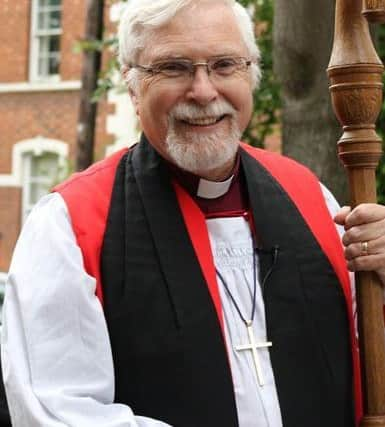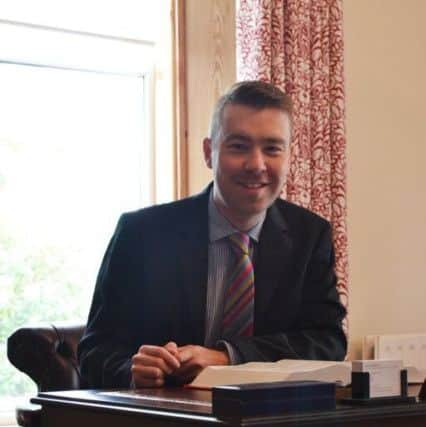Has the feast of Easter lost its spiritual meaning?


Easter is the oldest Christian holiday, and yet many will argue this holiest of feasts suffers from a major clash of interests: the sacred and the secular. What’s it really about, fluffy chicks and chocolate eggs, or Jesus being tortured to death on a cross?
In the Christian religion, Easter is the holiday that celebrates and commemorates the central event of the Christian faith: the resurrection of Jesus Christ three days after his death by crucifixion.
Advertisement
Hide AdAdvertisement
Hide AdThe resurrection is the centerpiece of the Christian faith, according to the Apostle Paul, who even says that if Jesus Christ had not been resurrected then the Christian faith is worthless and futile (1 Cor. 15:14-17). Therefore, without Easter there is no Christianity. All the Christian movable feasts and the entire liturgical year of worship are arranged around Easter.


But many are dismayed by the increasingly commercial nature of Easter and society’s seemingly spiritual deficiency.
For supermarkets Easter seems to start on Ash Wednesday, when the lemon juice and pancake mix are transfigured overnight into chocolate eggs and hot cross buns.
Easter may not be filling the pews in churches, but it is certainly seems to be flourishing in our consumer culture.
Advertisement
Hide AdAdvertisement
Hide AdRt Revd Harold Miller, Bishop of Down and Dromore, Church of Ireland, believes there is contemporary confusion around this major feast.


‘‘At about the age of 12, I remember being taken by my mother to a Three Hours Service in the local parish church.
‘‘This happened every year on Good Friday, between 12noon and 3pm, the ‘sixth’ and the ‘ninth’ hour, designating the time Jesus hung on the cross. She knew I wouldn’t manage three hours. Most people didn’t. They stayed for half an hour or so, and then went on about their business.
‘‘The service was sombre, the church was bare and devoid of colour, and the preaching was on the seven words of Jesus from the cross. But what I remember most was walking home.
Advertisement
Hide AdAdvertisement
Hide Ad‘‘Life was, in the style of an Ulster Protestant Good Friday, going on just as normal.
‘‘People were chatting, shopping, working, laughing. I felt as people do after a funeral.
‘‘The question in my mind was: ‘How can everything go on as normal when Jesus is dying on the cross?’ When I asked the rector, he responded: ‘That is like the first Good Friday. Everybody was going about their business as normal.’
‘‘Many years later, I went to the Holy Land for the first time, and walked along the Via Dolorosa (the way of sorrows), and saw the route Jesus took, as he carried the cross.
Advertisement
Hide AdAdvertisement
Hide Ad‘‘I always imagined it to be a place of quiet, meditation – a road apart. But it is the very opposite. The ‘stations of the cross’ are found along one of the busiest trading places in Jerusalem. Noise, colour, smells of produce, buying and selling!
‘‘Most people were so occupied with the ordinary things of this life on the first Good Friday that they didn’t see the eternal realities which were being accomplished before their very eyes. Jesus may as well have been just another of those criminals blocking the way and holding them back from their shopping.
‘‘This Good Friday it will be the same, here in Northern Ireland.
‘‘ For some, there may not even be an awareness that it is Good Friday.
Advertisement
Hide AdAdvertisement
Hide Ad‘‘You wouldn’t know from the TV schedules. You might just pick it up on the radio, or see an odd Christian group or two carrying a cross through the streets. ‘‘Even believers will not always take time to remember. That verse from Lamentations associated with Christ on the cross still resonates: ‘Is it nothing to you, all you who pass by? Behold and see if there is any sorrow like unto my sorrow.’
‘‘All of this means that Christians cannot depend on the world outside to sanctify the most precious of days.
‘‘The truths of Easter are most powerfully celebrated in a way which is dissonant, and challenging.
‘‘And it is only in the intentional walking of that way that we will be prepared for the joyful declaration of Easter Day (when the shops are shut!): ‘Christ is risen: The Lord is risen indeed. Hallelujah!’’’
Advertisement
Hide AdAdvertisement
Hide AdRev. Scott Moore, First Dromara Presbyterian Church, said Easter, for him, has never been the same since travelling with a group of colleagues to the Middle Eastern country of Jordan in 2017.
‘‘Last Easter, I watched a video of the church bells peeling around the Iraqi city of Mosul. The reason for this was, after almost three years, Christians were back in the city and back in their church, worshipping as we were, their resurrected Saviour, Jesus Christ.
‘‘During my visit to Jordan, I had the opportunity of chatting to A*. He chatted to us a little bit about his story. The bells that signalled rejoicing and jubilation, little did I know three years before, was also the sonorous signal for the city’s exodus. Three years ago, just after midnight, as A* and his family were well settled down for the night, the city’s church bells began to ring. The door of their home was banged and A* and his family were told that the city had been breached by Islamic State Militants and they had less than thirty minutes to make one of three choices. They could remain and convert from the faith of their forefathers to Islam, they could remain and face the wrath of their enemies for refusing to convert or they could flee. A*, his wife, children, parents and siblings (in total 37 members of his family) fled.
‘‘I wonder as a Christian minister how many times I have read or preached about the Israelites leaving Egypt in the book of Exodus, or New Testament passages concerning giving up my all to follow Christ, and I would say it wasn’t until now that those connotations began to resonate deeply within me. Never will I preach those passages with the same Western blasé again. Now, as we sing the well known lines, On Jordan’s bank the Baptist’s cry, announces that the Lord is nigh. Awake and harken, for he brings, glad tidings of the King of kings!”
Advertisement
Hide AdAdvertisement
Hide Ad‘‘I can’t help but think of the tremendous faith of persecuted brothers and sisters across the world. On Easter Sunday, my congregation will gather at dawn to worship and celebrate the fact, “He is not here, He is Risen.” Christians in the Middle East, though it be dangerous, will worship and celebrate the fact, “He is not here, He is Risen.” What about you, this Easter?
‘‘Matthew 28:6-7 says, “He is not here, He is Risen, as He said. Come, see the place where He lay. Then go quickly and tell His disciples that He has risen from the dead.”
‘‘This Easter, without hindrance, will you come? Our churches would love to welcome you! This Easter, without hindrance, will you see? Our churches would love to show you, from God’s Word, that this Jesus is worth worshipping (even until the point of death).
This Easter, without hindrance, will you go? This is Good News, and our work places, families and friendship circles need it. This Easter, without hindrance, will you tell? The world needs to hear this message! Will you join me in telling it, to everyone, this joyful Easter time.’’